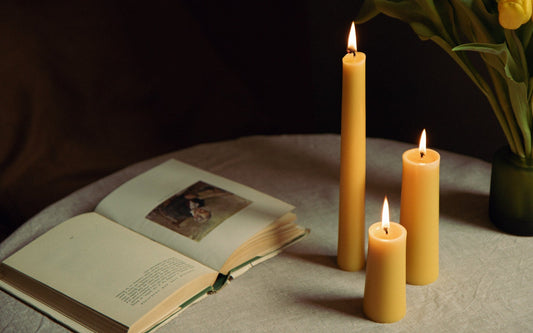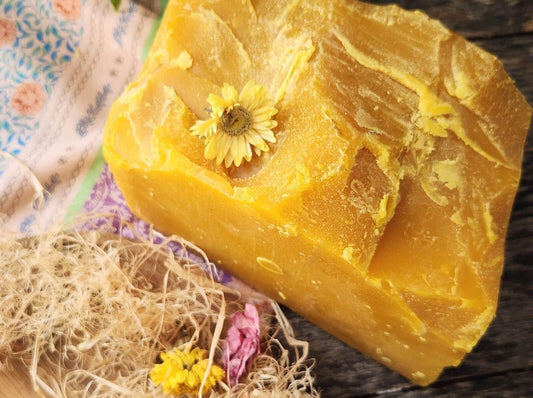Meeting the Beekeeper: Gael Wilkinson
Nestled among Scotland's picturesque landscapes, Gael Wilkinson, the visionary behind Kin Bees, welcomes us into her world of award-winning honey and sustainable beekeeping. From chance encounters on Perthshire hills to the art of nurturing delicate ecosystems, Gael shares her remarkable journey.

BZZWAX: How did you get into beekeeping? What sparked your interest in this fascinating practice?
Gael: I fell into beekeeping completely by accident. I'd always been fascinated but I was doing some market research for a private venue and they had bees. They asked if I'd like to see them and the next thing I knew I was on a Perthshire hillside in a bee suit. When he opened the roof and I looked inside I was completely fascinated and totally hooked. I still get the same feeling every time I open a hive.
What are some of the biggest challenges you've faced as a beekeeper? How have you dealt with them?
The first challenge to beekeeping is the initial cost. If you worked out how much your first jar of honey cost you'd run a mile! Not everyone is there for the honey though. For many beekeepers, the process is enough but it can be an expensive hobby and honey is a way to recoup your considerable costs. It's enabled me to grow my hive numbers and invest in good quality equipment. There is no funding available for beekeepers through the normal farming finance route (something that irks especially when agriculture is so dependent on apiculture) so you really need to have a good marketing head to make your brand stand out and just pray nobody immediately copies you!
Secondly locations. There are many more beekeepers around than you'd imagine and I'm particular about where I place my hives. It has to be just right for the bees' needs and not every beekeeper is quite as picky and will put them anywhere they can. Often very close to other hives so they're in competition for the forage which can weaken them. Finding a great secure spot away from pesticide use with access to water and loads of forage is always my goal. I've been lucky enough to find some fantastic farmers who are more than happy to host my hives as they provide free pollination services!
How do bees actually help the environment? Can you share some cool examples of how they promote biodiversity?
What people often don't realise is that our native trees also flower including the big guns such as oak, sycamore and lime. These huge trees hold the soil together, keep our air oxygenated and create habitats for other wildlife. Bees actually underpin our entire ecosystem.
"Bees actually underpin our entire ecosystem."

Why should we care about preserving bees? What are the surprising benefits they bring to our everyday lives?
If you've ever sat down and watched a busy bee going about its business you'll know what a mindful experience that can be. We're all so busy that just taking time to be with nature can be so beneficial to our mental and physical health. Bees actually pollinate almost everything you eat. Every fruit that's picked or vegetable that's grown from seed needs a pollinated flower. Even our meat needs fed and that food comes from plants that need to be pollinated.
Have you noticed any changes in beekeeping practices over the years? Are there any new tools or techniques that have made your job easier?
Poly hives have made a huge change. Traditionally hives were made of wood and were complicated to build and heavy to move. Now high-density poly hives are available which will last just as long, are assembled in seconds, are very light to move and no trees are required!
Have you ever tried beekeeping in an urban setting? What kind of impact can it have on the local community?
No but I know many people who do but have started to move their hives out of cities such as London as the areas are becoming overloaded with hives and the bees are struggling for forage as there's just too much competition. In more rural areas they're fantastic for veg plots and allotments.
What's the most rewarding part of being a beekeeper? Any heartwarming or funny stories you'd like to share?
I have met so many amazing people and every week something different happens. Last year I met The King who, along with The Queen, had my honey in their Earl Gray tea at a state visit. Another day Im giving a talk to incredibly enthusiastic school children or Im meeting up with beekeepers from all over the world.
Just this month I was able to support a bee farmer who'd had to give up his business after a stroke 10 years ago. I installed some new hives in his rural garden and along with his wife's help he's back beekeeping. Despite being pretty nonverbal we managed to chat bees all afternoon and his wife said she hadn't seen him smile like that for years. It was such a fulfilling moment.
"You will get stung. It hurts. But it goes away!"

How can someone start beekeeping on a smaller scale, like in their own backyard? Any tips for beginners?
There's a lot to think about before you get bees. Firstly check your property deeds. Some have restrictions. Secondly, check if there are other hives nearby. Then learn. Read Read Read. There are tons of fantastic social media groups and blogs out there too.
Your neighbors won't thank you if your hive swarms and it goes into their chimney or roof so you need to have the knowledge and spare equipment to deal with every situation. I'd recommend getting a mentor.
Many experienced beekeepers will sell you your first colony of bees and then support you through the first year. Having someone at the end of a phone for instant reassurance can be invaluable.
Also, many books say 1 hour per week per hive. I've NEVER found this to be true. It's a lot more time-consuming than you'd expect but is also extremely fulfilling and rewarding. Plus you'll always have something interesting to talk about at parties!
Are there any misconceptions about bees or beekeeping that you'd like to clear up?
That it's easy and that you can put bees in a hive and they can look after themselves! Looking inside the hive once a week is the easy bit but there's so much more involved and it's very time-consuming.
A bee swarm is one of nature's most amazing sights. It's loud and can appear frightening but its completely natural and the bees are not interested in stinging anyone. They're just on their way to their new home. Honeybees and bumblebees are not the same thing and beekeepers can't move/rehome/destroy bumblebee nests - mainly because they sort themselves out and disappear within a few weeks.
Real honey is amazing. You may have tried supermarket or imported honey but it's NOT the same thing at all.You will get stung. It hurts. But it goes away!
What does the future of beekeeping look like? Are there any exciting developments or trends on the horizon?
Honeybees, and bees in general, are still threatened by loss of habitat (the UK has lost 97% of its wildflower meadows since WWII), pesticide use (the UK Government keeps sanctioning the use of banned pesticides which are death to pollinators) and the virus loaded varroa mite which continues its march around the globe.
There are still too few treatments for varroa and very little investment in finding any. The additional creation of huge areas of monoculture from Big Farming continues to reduce habitat diversity and put our pollinator numbers and species under pressure.
On a more positive note bees are in the public consciousness, if not our governments, and campaigns to save habitats and increase diversity can really have an impact. Many businesses have moved away from old skool greenwashing and have been smart enough to see the tangible PR opportunities of putting some of their profits into genuine eco projects and are evolving into more sustainable entities which I see as hugely positive and a trend I hope continues in these increasingly austere times.
There's also a lot of new tech out there. Monitoring seems to be a big thing with new companies popping up all the time attempting to gather enough data to create warning systems to aid beekeepers. i.e. is this super ready to harvest, are the bees preparing to swarm? It's not quite there yet but I've no doubt it will happen.
The biggest thing is the general public genuinely wants to support our pollinators and wildlife and we're tapping into our own green spaces and making our gardens into little havens where bees can thrive and we can find moments of calm alongside them. And I love that.

Through her passion, perseverance, and dedication, Gael reminds us of the remarkable ways these tiny pollinators orchestrate the symphony of our ecosystems. As she envisions a future where gardens and green spaces flourish with life, we're inspired to join her in safeguarding these vital creatures.
With each jar of Kin Bees' honey, we taste not only nature's sweetness but also the fruits of Gael's labor of love—an enduring reminder that a single individual can make a lasting impact on the world we share.




